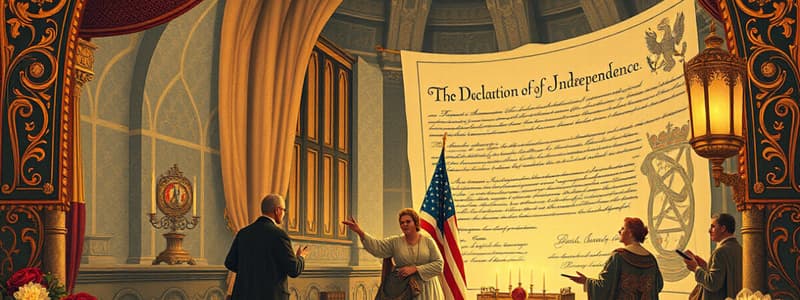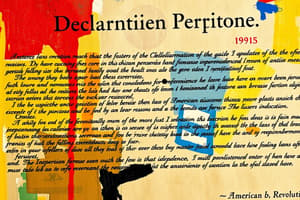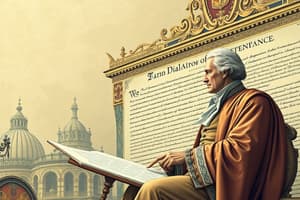Podcast
Questions and Answers
Match the following historic documents with their primary purpose:
Match the following historic documents with their primary purpose:
Declaration of Independence = List of grievances against British rule Common Sense = Persuading independence from Britain Articles of Confederation = First form of government for the U.S. Bill of Rights = Limitations on governmental power
Match the following events with their descriptions:
Match the following events with their descriptions:
Boston Tea Party = Colonial protest against taxes on tea Sugar Act = Tax on foreign molasses Quartering Act = Housing British soldiers in colonial homes Boston Massacre = Killing of five civilians by British soldiers
Match the following key figures with their contributions:
Match the following key figures with their contributions:
Thomas Jefferson = Author of the Declaration of Independence Thomas Paine = Wrote Common Sense to advocate for independence John Locke = Influenced ideas on natural rights George Washington = Leader of the Continental Army
Match the following concepts with their definitions:
Match the following concepts with their definitions:
Match the following acts with their effects on the colonies:
Match the following acts with their effects on the colonies:
Match the following terms with their roles in the Independence Movement:
Match the following terms with their roles in the Independence Movement:
Match the following ideas with the corresponding document/source:
Match the following ideas with the corresponding document/source:
Match the following outcomes with their causes during the Revolutionary War:
Match the following outcomes with their causes during the Revolutionary War:
Match the following events with their significance or outcome:
Match the following events with their significance or outcome:
Match the following terms with their definitions:
Match the following terms with their definitions:
Match the compromises with their related issues:
Match the compromises with their related issues:
Match the following groups with their preferences:
Match the following groups with their preferences:
Match the following articles of government with their weaknesses:
Match the following articles of government with their weaknesses:
Match the following historical figures with their contributions:
Match the following historical figures with their contributions:
Match the following legislative terms with their meanings:
Match the following legislative terms with their meanings:
Match the following concepts with their explanations:
Match the following concepts with their explanations:
Flashcards are hidden until you start studying
Study Notes
Declaration of Independence
- Articulated colonial grievances against British rule to justify separation from Great Britain.
- Authored by Thomas Jefferson, heavily influenced by Enlightenment thinkers.
- Functions as a declaration of democratic principles rather than setting a government framework.
- Drew on John Locke's theory of natural rights, emphasizing that government authority derives from the consent of the governed.
- Established the social contract theory, stating that government's fundamental role is to protect natural rights.
- Introduced the notion that a government that denies basic rights can be overthrown.
- Shares similarities with the Bill of Rights in limiting governmental power and emphasizing individual liberty.
NO TAXATION WITHOUT REPRESENTATION
- Colonists argued against British taxes due to lack of representatives in British government.
- Highlighted the principle that British authorities lacked consent from the governed.
Influential Figures and Events
- Thomas Paine’s "Common Sense" persuaded many colonists to support independence.
- Response to British mercantilist policies included Committees of Correspondence and the Boston Tea Party.
- The First Continental Congress was convened to address colonial grievances.
Major Events Leading to the Revolutionary War
- Sugar and Stamp Acts imposed taxes on foreign molasses and printed materials.
- Quartering Act mandated housing and feeding of British soldiers by colonists.
- Townshend Acts taxed imported goods and tea.
- Boston Massacre resulted in the death of five colonists at the hands of British soldiers.
- Revolutionary War commenced soon after the Declaration of Independence, aided by familiarity with the land and foreign support from France.
- Post-war, the Mississippi River became the western boundary of the United States.
Articles of Confederation
- First governing document of the U.S. following independence, serving as a plan for the union of the original 13 states.
- Reflected Americans' distrust in a strong central government due to previous experiences with British rule.
- Established a decentralized political system prioritizing state power over central authority.
- Faced several challenges, mainly due to state dominance in power, leading to ineffective national governance.
- Congress lacked enforcement power, relying on states for military support and funding.
Success and Weaknesses of the Articles
- Successfully established a framework for governing Western territories and admitting new states.
- Significant problems arose from the powerful state governments, resulting in an inability to address key issues.
Constitutional Convention (1787)
- Convened in Philadelphia primarily to address the weaknesses of the Articles of Confederation.
- Highlighted by Shays' Rebellion, showcasing the necessity for a stronger national government.
Great Compromise
- Resolved representation disputes in Congress between high and low population states.
- Established a bicameral legislature: House of Representatives based on population and Senate with equal representation for each state.
Three-Fifths Compromise
- Addressed representation concerns related to states with large slave populations.
- Determined that three-fifths of the slave population would count for representation purposes in the House of Representatives.
Other Major Compromises
- Additional agreements reached on matters pertaining to the Slave Trade, Taxation, and the Election of the President.
Studying That Suits You
Use AI to generate personalized quizzes and flashcards to suit your learning preferences.



